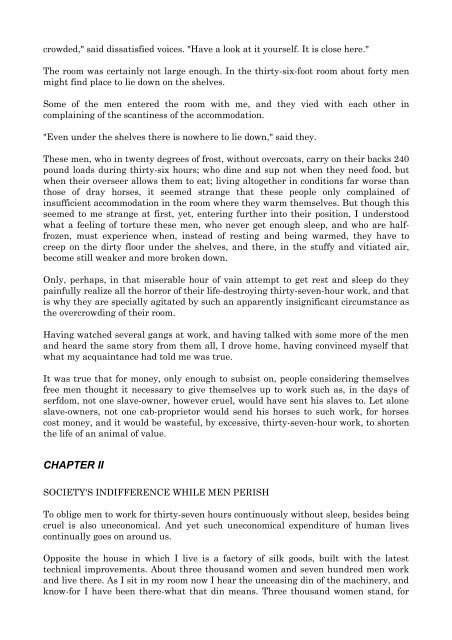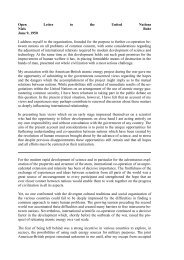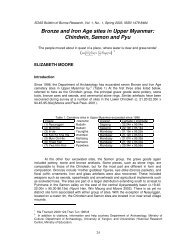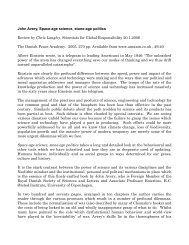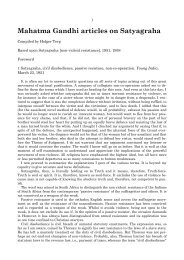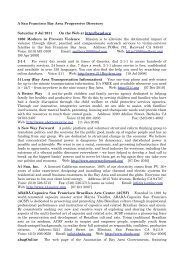THE SLAVERY OF OUR TIMES PREFACE / INTRODUCTION
THE SLAVERY OF OUR TIMES PREFACE / INTRODUCTION
THE SLAVERY OF OUR TIMES PREFACE / INTRODUCTION
You also want an ePaper? Increase the reach of your titles
YUMPU automatically turns print PDFs into web optimized ePapers that Google loves.
crowded," said dissatisfied voices. "Have a look at it yourself. It is close here."<br />
The room was certainly not large enough. In the thirty-six-foot room about forty men<br />
might find place to lie down on the shelves.<br />
Some of the men entered the room with me, and they vied with each other in<br />
complaining of the scantiness of the accommodation.<br />
"Even under the shelves there is nowhere to lie down," said they.<br />
These men, who in twenty degrees of frost, without overcoats, carry on their backs 240<br />
pound loads during thirty-six hours; who dine and sup not when they need food, but<br />
when their overseer allows them to eat; living altogether in conditions far worse than<br />
those of dray horses, it seemed strange that these people only complained of<br />
insufficient accommodation in the room where they warm themselves. But though this<br />
seemed to me strange at first, yet, entering further into their position, I understood<br />
what a feeling of torture these men, who never get enough sleep, and who are halffrozen,<br />
must experience when, instead of resting and being warmed, they have to<br />
creep on the dirty floor under the shelves, and there, in the stuffy and vitiated air,<br />
become still weaker and more broken down.<br />
Only, perhaps, in that miserable hour of vain attempt to get rest and sleep do they<br />
painfully realize all the horror of their life-destroying thirty-seven-hour work, and that<br />
is why they are specially agitated by such an apparently insignificant circumstance as<br />
the overcrowding of their room.<br />
Having watched several gangs at work, and having talked with some more of the men<br />
and heard the same story from them all, I drove home, having convinced myself that<br />
what my acquaintance had told me was true.<br />
It was true that for money, only enough to subsist on, people considering themselves<br />
free men thought it necessary to give themselves up to work such as, in the days of<br />
serfdom, not one slave-owner, however cruel, would have sent his slaves to. Let alone<br />
slave-owners, not one cab-proprietor would send his horses to such work, for horses<br />
cost money, and it would be wasteful, by excessive, thirty-seven-hour work, to shorten<br />
the life of an animal of value.<br />
CHAPTER II<br />
SOCIETY'S INDIFFERENCE WHILE MEN PERISH<br />
To oblige men to work for thirty-seven hours continuously without sleep, besides being<br />
cruel is also uneconomical. And yet such uneconomical expenditure of human lives<br />
continually goes on around us.<br />
Opposite the house in which I live is a factory of silk goods, built with the latest<br />
technical improvements. About three thousand women and seven hundred men work<br />
and live there. As I sit in my room now I hear the unceasing din of the machinery, and<br />
know-for I have been there-what that din means. Three thousand women stand, for


